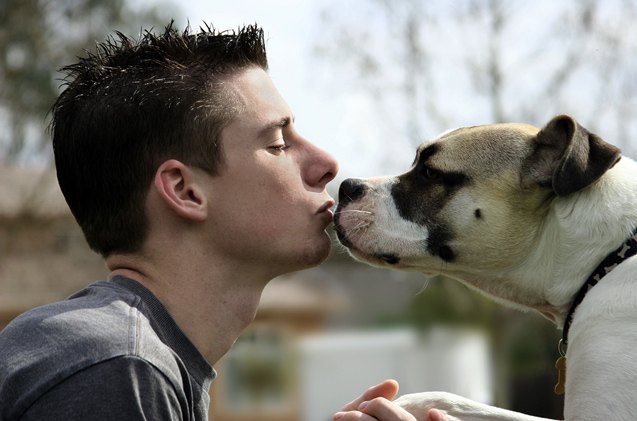Therapy Dogs May Be The Key To Less Stress And Loneliness At Colleges

We all know it to be intuitively true: when we spend time with animals, our stress seems to melt away. Now, science is giving us some hard data to back up that assumption.
The transition to college can be an exceptionally stressful and lonely time, and it’s something that college counselling centers are dealing with all too frequently these days. As a result, counselling centers are being forced to try out treatment methods that are both creative and cost effective.
Related: Students Allowed To Bring Their Pets To School
As part of a collaborative study, researchers from the University of Georgia, Idaho State University and the Savannah College of Art and Design provided group animal-assisted therapy to a group of 55 college students in the hopes that it would make a difference. Their findings were published in the latest edition of the Journal of Creativity in Mental Health.
The results were staggering: 60 percent of the students reported a decrease in their anxiety and loneliness levels after receiving animal-assisted therapy. A full 84 percent of the students said the time they spent with therapy dog Sophie was the most impactful part of the program.
Related: Show And Tell: Pets In The Classroom
So, just what was “the program”?
Well, researchers held twice-monthly group sessions during one academic quarter. For the sessions, students were invited to stop by and spend time with Sophie, a white German Shepherd, for up to two hours. All the students had the option to pet, hug, brush, feed, photograph, draw, sit near and play fetch with her. (Sounds pretty great to us! Do we get extra credit for this playtime as well?)
This is the first time animal-assisted therapy has been used in a group, college setting and researchers are optimistic about what the results may mean going forward.
“The presence of a therapy dog facilitates a therapeutic connection between the client and the mental health professional,” said Dr. Lindy Parker of Georgia State. “When you’re trying to do mental health work with someone, establishing that therapeutic relationship and rapport is so important. Any way to do it faster or more effectively only helps facilitate the therapeutic process.”
And just why do dogs make such great therapy animals? Dr. Franco Dispenza, also of Georgia State, says that because dogs have become so domesticated, they’ve developed an uncanny ability to read human cues. For instance, a dog can tell when you’re sad and will likely take action to try and comfort you — something dog owners have likely witnessed in their own pooches.
All we have to say is: go therapy dogs! And when can we get one for our office?
[Source: Science Daily]

Christina Peden is a lifelong animal lover and avid wordsmith. She lives in Toronto with her boyfriend Ryan where they are proud pet parents to puppy, Matilda and cat, Oscar. In her spare time, she can be found enjoying Toronto, Canada's all-too-short patio season, taking advantage of the city's numerous parks or curled up with a good book.
More by Christina Peden









![Therapy Dog Comforts Grieving At White Plains Funeral Home [Video]](https://cdn-fastly.petguide.com/media/2022/02/16/8209475/therapy-dog-comforts-grieving-at-white-plains-funeral-home-video.jpg?size=350x220)













